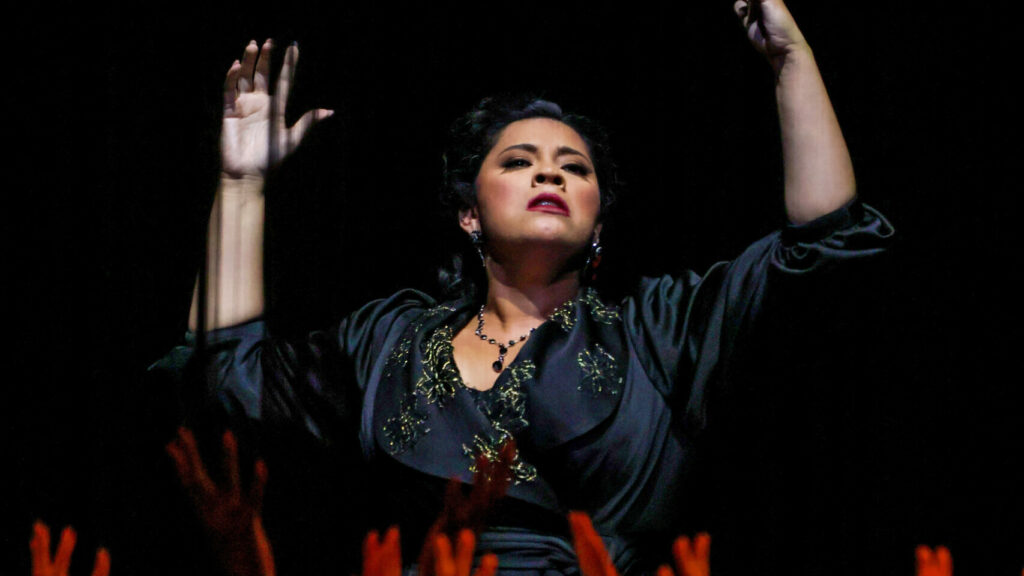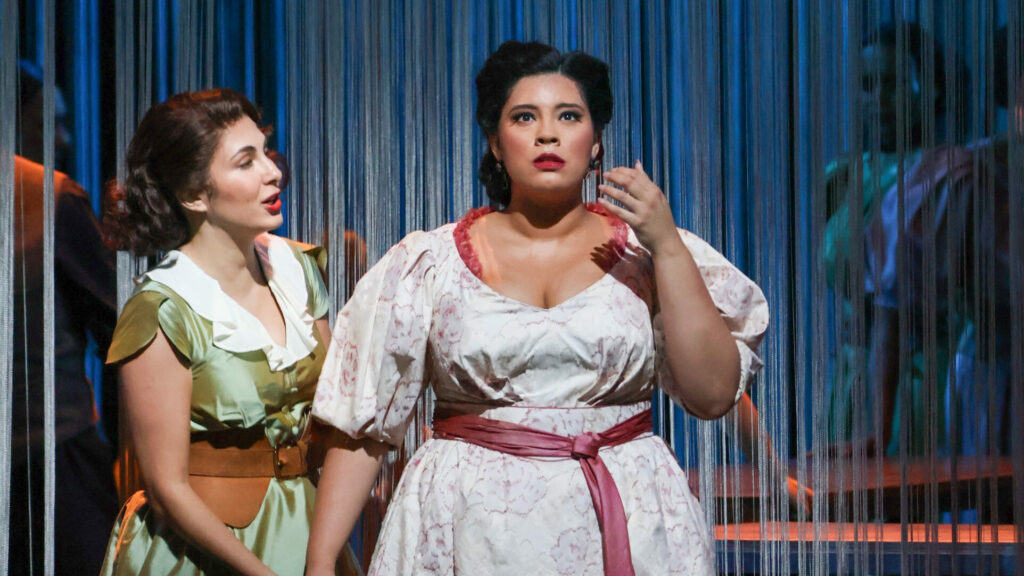Or perhaps, as in Osvaldo Golijov and David Henry Hwang’s opera, those two are one in the same.
Fascism, in its classical sense, prioritizes the masculine, worshipping at the altar of the Fatherland with the Generalissimo, Duce, or whatever flavor of jackass in fancy dress at its helm as an avatar of national virility. Production director Deborah Colker is intently aware of this dynamic and has Lorca’s falangist persecutor Ramón Ruiz Alonso, ferociously realized by flamenco singer Alfredo Tejada, rolled in on a platform like a bellicose idol come to life. The feminine becomes suspect, enmeshed with national decadence and decline, and finds itself as one of the primary mechanisms by which the state can return to its former greatness: women will lie back and think of the empire, and a new generation of “pure” [insert race and nationality here] will spring up to make the glorious past the future. The Radio Falange broadcasts that air over the roiling transitions within the opera’s second “image” promise to exterminate the seeds of communist infiltrators, Jews, and homosexuals “even in their mothers’ wombs.” The womb is as much a battleground as the outskirts of Guadalajara or the Jarama Valley.
The diva, as embodied by Margarita Xirgu, presents an alternative. Lorca hails his leading lady as the “proletariat queen of the Spanish theater”—a deliberate and cheeky collapsing of social classes—and declares, “tú eres todas y eres una:” you are all and you are one. In Lorca’s eyes, she is “Antigone furiosa,” Hamlet, Mariana Pineda, and Margarita all at once. The opera advances the idea that her art, that her ability to carry and project myriad identities her characters from within, is a source of resistance. The diva is polyphonic and creative, whereas the fascist is monophonic, demanding conformity the point of destruction. It is this polyphonic spirit, along with the poetry of Lorca, that she passes down to her students in Uruguay.
And within the framework of the opera, Margarita also must be all and one: a youthful actress, an aging muse in Marian mourning, a teacher to Nuria, a conduit for Lorca’s memory, and, for the final time, Mariana Pineda. The soprano playing Margarita must convey all of this in under 90 minutes. Last Wednesday, that task fell to Nicaraguan American soprano Gabriella Reyes, who assumed the role from current Metropolitan Opera prima donna in training Angel Blue for a single performance.
Reyes, having led Colker’s production for the entirety of its Detroit run last year, was able to step back into the role’s physical demands with ease. The production makes little distinction between principals and dancers; the principals and chorus of niñas are often fully integrated into the choreographic sequences, and the work of solo flamenco dancers Isaac Tovar and Sonia Olla are arias unto themselves. She moved with a confidence and authority onstage that made us believe, despite her youth, that she was a storied diva. Her dancing was likewise fluid. She suffused her exchanges with Lorca with a warmth that fleshed their relationship out of the Passion Play efficiency of Hwang’s libretto.
Yet, frequent audibility issues throughout the first scenes undercut the success of her transition of the role into a larger house: Margarita’s opening lament, which should cut through the wailing niñas, sounded pale and distant, resulting in a balada that lacked the tension it needed to carry off its climax. She is not entirely to blame here; conductor Miguel Harth-Bedoya’s reading of the score was propulsive to the point of covering many of the singers, and sound design by Mark Grey failed to establish an effective balance between the pre-recorded sound effects, the smattering of amplified singers, percussionists and guitarists, and the orchestra. Not only that, but the singers were also often up against the stamping and clapping of the dancers.
In the more exposed sections, however, we could appreciate the beauty of her singing. The smokiness of her lower register contrasted with the iridescence of her top notes, which she punctuated with some well-parsed crescendos. Her swooning lines during the Havana scene had an easy charm, and her final cry of “¡Yo soy la libertad!” was suitably exhilarating, sailing over the pit in a shimmering, concentrated beam of sound. It is a shame she will not have additional performances to calibrate her vocal approach further, as her commitment the role was admirable.
As her student Nuria, Elena Villalón’s sprightly, pure-toned soprano communicated the aspiring actress’s blend of preciousness and naiveté. Her fiery recitation of a verse from Lorca’s “Balada de la placeta” was the dramatic highpoint of the evening; her delivery rekindled the embers of the poet’s words and made clear why we should care about Lorca not only as a victim of fascism, but as an artist of immense vitality and beauty. Daniela Mack brought a deep-rooted mezzo-soprano and boyish swagger to the role of Lorca. A haunting stillness permeated her “Desde mi ventana,” Lorca’s aria to the statue of Mariana Pineda that stood outside the window of his childhood bedroom, even as her legato remained consistent. With the exception of Tejada, the genuine article, Mack came closest to vocally capturing the ineffable ache and passion at the heart of the flamenco idioms woven throughout the score.
Photos: Beth Bergman





